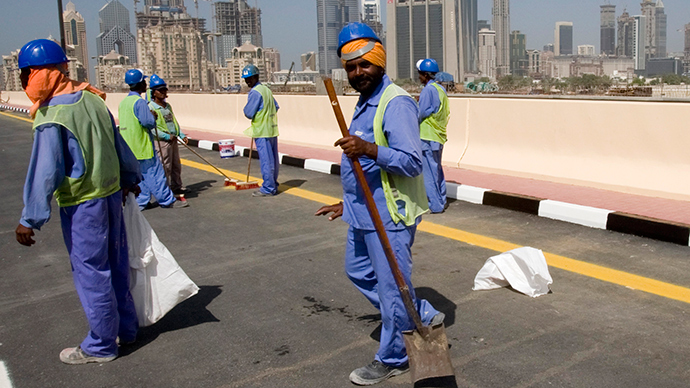The plight of Indian workers in the Gulf
Infamous for ill-treating Indian workers, the Gulf continues to stand in bad light as some migrants return back to the country after facing fraud and torture, and some families weep over the demise of their loved ones.
A migrant worker in Dubai, Chittam Malaya, 45, was reported dead last month. Hailing from Kalleda village in the south Indian state of Telangana, he is said to have died of a stroke, a fact hard to believe for others from the village, who mourned a second migrant’s death in the month of September. “We were told Chittam died of a stroke, but he was healthy when he came home for a visit last month,” Ankathi Gangadhar, the former village head of Kalleda, told the press.
It is not the first time, that a dead body has returned home from Dubai, a country now infamous for ill-treatment of migrant workers. Since 2014, nearly 450 dead bodies have been sent back to India.
Another man, a 24-year-old, whose body was sent to Telangana, was also said to have been suffering from heart attack.
A largely rural region, Telangana has seen a big chunk of its population migrate to the Gulf and be subject to various atrocities, including death. As per media reports, officials from the state cite stress, ill health and working in searing temperatures as the most common causes of death, and say fatality numbers among migrants who travel to the Gulf from the state have remained stable.
People travel to the Gulf in search of better job opportunities, which they source via agents. Often lured on lines of a better lifestyle and pay, the migrants in fact, lose money in order to reach Dubai, and hardly earn enough to make up for it.
Workers also take loans of up to INR 100,000 to pay to these agents.
The main reason for people to flee Telanagana has been their farming job, which was affected due to water scarcity.
“People discuss these deaths for a week, but then there is no initiative (to offer jobs here) so they keep leaving,” the Thomson Reuters Foundation quoted Gangadhar. “When people started leaving for Gulf states (in the 1980s), this region was reeling from years of drought. They had no option but to migrate,” said Suresh Reddy, a politician from Telangana who has worked on the migration issue. “When they left, there were some economic gains but they paid a heavy price for it – working in inhuman conditions and leaving their families behind.”
Chittam was only able to save up to INR 12,000 annually, and he sent back home INR 4000-5000, every few months. In the 13 years, he had worked in Dubai, he visited home just five times.
“He was planning to return for good next year after making a little more money,” Gangadhar told the media.
Not the only one
Chittam is not the only one who fell for the offerings of the gulf country, and landed in trouble.
“I saw a lot of misery there. Workers were underpaid and poorly treated. They were cheated by their agents with false promises so I thought I would come back and bring a change,” said Ramanna Chitla, who, after 16 years of working in Dubai has returned to Telangana to stop others from falling into the trap.
Official data shows that there are six million Indian migrants in the six Gulf states of Bahrain, Kuwait, Qatar, Saudi Arabia, United Arab Emirates (UAE) and Oman. It has also been reported that, between 2005 and 2015 more than 30,000 Indian nationals died in the Gulf states.
Another worker, Chandrasekhar Boragalla, 26, landed up paying more than he actually received for the job of a cleaner at sea-front office in Dubai. “I paid INR 70,000 to the agent for this job. When I reached there, they made me sign a two-year bond for a salary much lower than what was promised. I wasn’t even paid for three months. I was asked to pay INR 85,000 for leave to go home,” he said.
Boragalla is now back home, working for a petty amount, and setting aside from it the money to repay the loan. He earns INR 400 per day – “It’s not enough. Dubai is danger. I will not go back,” he said.










